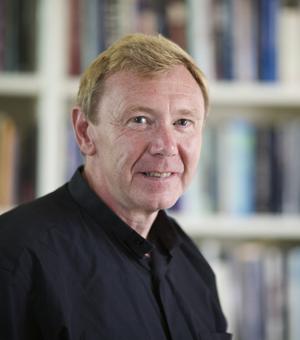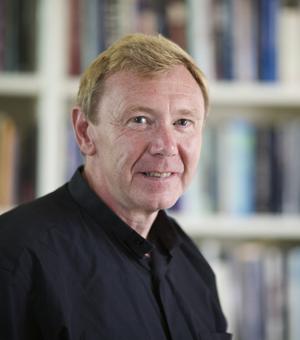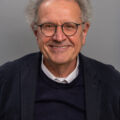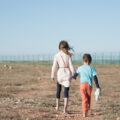Through the apocalypse: Graham Ward on religion’s future in the wake of migration
Through the apocalypse: Graham Ward on religion’s future in the wake of migration
In an interview with the European Academy on Religion and Society (EARS), Professor Graham Ward, Regius Professor of Divinity at Oxford University, discusses the complex relationship between migration and religion. He moves beyond traditional views, emphasising how both of these shape social and cultural dynamics, along with personal beliefs and identities. Known for his innovative approach to theology and religious studies, Ward’s work has focused on the ethical dimensions within Christian doctrines and their connection with contemporary culture, psychology, and philosophy. His insights are particularly relevant in understanding the effects of migration on religious life and vice versa, especially in the context of Europe’s diverse and evolving social structures.
The relationship between migration, religion, and society is not only a crucial area of academic inquiry but also the subject of public debate. Professor Graham Ward, the Regius Professor of Divinity at Oxford University, discusses this relationship with the European Academy on Religion and Society (EARS) in a thought-provoking interview. Known for expanding the scope of divinity studies beyond traditional Christian theology, Professor Ward integrates a broad spectrum of religious, cultural, psychological, and philosophical studies to shed light on the complex ways migration and religion influence and transform society. Ward, drawing on his extensive experience in varied urban settings, speaks to the profound influence of migration on religious communities. He notes how it fosters inclusivity and diversity, providing insights into religion’s changing role amid global migratory movements. His analysis offers an interdisciplinary perspective, enriching the dialogue on the future of religion in our dynamic world.
Migration and religion
Growing up in Manchester, Graham Ward observed profound changes brought about by waves of migration, leading to a significantly more multicultural society. Ward remarks, “I grew up in Manchester in the 60s-70s and the main difference was between Catholics and Protestants; then migration had to do with these religions and migration coming from Ireland and Scotland, causing all sorts of tensions.” He notes that the initial ghettoisation of migrant communities eventually gave way to greater integration and deeper understanding across religious traditions. Ward explains this: “When I had written a book on religion much earlier and drawn attention to these waves of migration, they were in part creating communities; they were ghettoised. But this began to change.” Driven by a second generation of migrants, segregated communities become more integrated into society. He notes, “The second generation of migrants integrated much more into the cultural situation … Racial supremacy, religious mixed classes, and racial dimensions were not dominant issues anymore.” With this, Ward highlights the significance of cultural integration and how it evolves with each new generation.
“The second generation of migrants integrated much more into the cultural situation … Racial supremacy, religious mixed classes, and racial dimensions were not dominant issues anymore.”
Ward, however, emphasises that migration is not merely a cultural issue but also encompasses political and economic dimensions. He explains, “Migration is a very complex issue … If the trend towards nationalist politics turns into rampant xenophobia, we have serious global problems.” Migration, often perceived through a cultural lens, is, in fact, significantly influenced by political and economic factors. Addressing the interconnections between these factors, Ward states, “Religions will be in that mix because migrants often come from countries with stronger religious traditions than in some parts of Western Europe.”
Visibility of religion in Europe
Ward believes that migration and evolving social attitudes are increasing the visibility of religion in Europe. He starts by critiquing post-WWII secularism in Europe, suggesting that such an approach has led to cultural wars and ideological clashes. “I think migration is raising the issue of religion within the EU – because what is Western Europe nowadays? There’s an increasing sense of the religious,” Ward states, highlighting how migration has brought about a renewed awareness of religious diversity. Ward advocates for a softer, more inclusive approach to cultural integration, where religion is part of the public sphere without being suppressed by state mechanisms. He observes that the radical secularism following WWII, aimed at integrating a European community, inadvertently set the stage for cultural conflicts. “When you start to legislate secularism then you have the problem of culture wars; ideologies that clash with each other,” he notes, pointing out the challenges of enforcing a secular ideology.
According to Ward, this approach often fails to accommodate the complexities of a diverse society. He explains, “Cultures are much softer as they work through creative relationships and can deal with assimilation.” This perspective suggests that softer cultural processes are more effective in dealing with religious diversity than rigid state legislation. Ward further comments on the relationship between migration, religion, and secularism: “Certain countries legislating secularism make it difficult when there is a new visibility of religion within the public sphere.” There is tension, therefore, between secular policies and the visible practice of religion in public life.
“When you start to legislate secularism then you have the problem of culture wars; ideologies that clash with each other.”
Role of culture in integration
Despite his emphasis on culture, Ward cautions against a monolithic view of culture, advocating instead for an understanding of culture as shaped by micro-processes within communities. Ward states, “Cultures are assimilationist and syncretic. So, when I talk about culture, I talk about all these (micro) processes that go on between locations and communities, not necessarily in a larger monolithic sense that would be ideological.”
Ward’s perspective considers culture as a medium through which integration and assimilation can occur more organically, without being forced by political ideologies. He explains, “The difficulty is that culture is soft, creative, hybrid, and done through relationships, which makes it kind of easy to manipulate by forces that want to highlight aspects.” Culture, being fluid and adaptable, is a key factor in fostering integration and understanding among diverse groups.
“The difficulty is that culture is soft, creative, hybrid, and done through relationships, which makes it kind of easy to manipulate by forces that want to highlight aspects.”
Ward elaborates on the role of culture in accommodating different religious traditions and beliefs. He asserts, “People were not necessarily interconverting between faiths, but there was an increasing understanding of the moral stature within different faiths.” This highlights for Ward the importance of cultural adaptability in recognising and respecting the diverse moral and ethical frameworks present in a multicultural society.
Future of religion
Ward envisions a future for religion that is deeply connected with societal changes, particularly in the context of Europe and globally. He foresees “an increasing awareness that people are religious and an increasing awareness of the diversity of the ways in which people are religious and express this.” This trend towards a broader, more inclusive understanding of religiosity reflects a shift from traditional, institutional religious practices to more individualised and diverse expressions of faith.
One of the most significant trends highlighted by Ward is the rise of ‘soft doctrine’ religions, like mindfulness, which are becoming more prominent as a means to cope with global stressors. He notes, “Religions have always been part of a social therapeutics. In the wake of secularism and the rise of psychology, soft doctrine religions like mindfulness are coming more to the fore as a means of coping with stress factors around the world. Mental health is high on the social agenda right now.” This trend suggests a move towards spiritual practices that are more aligned with contemporary issues of mental health and well-being, indicating a potential increase in hybrid and syncretic forms of religiosity.
Ward, therefore, foresees a questioning of secular ideologies and a deeper exploration of religious traditions. He notes, “The enormous climate anxiety causes people to think about their day-to-day lives … I think with such anxiety it means there will be much more religiousness.” In other words, existential concerns will drive people towards seeking spiritual and religious solace.
It follows that Ward sees the future of religion as not just a matter of personal belief systems but also as a vital component in addressing broader societal and global challenges. He suggests, “The idea of increasing (need for) religious/mindfulness is thus hopeful, creative, and not too far away from having religious values that belong to traditions.” This perspective indicates his belief in the positive role that religion can play in fostering well-being and resilience in the face of adversity.
“The idea of increasing (need for) religious/mindfulness is thus hopeful, creative, and not too far away from having religious values that belong to traditions.”
Living through an apocalyptic future
Underlying Ward’s views of migration and religion is his belief in the potential role of religion in fostering a sustainable way of living, particularly through the interaction between migrants and native religious communities. He highlights the importance of collective will and openness in addressing migration challenges. “If there is a collective will and desire to see change and face the issues with migration, then we might see the need to approach the issues through the lens of hospitality,” Ward explains, underlining the significance of a community-driven, hospitable approach to migration.
“If there is a collective will and desire to see change and face the issues with migration, then we might see the need to approach the issues through the lens of hospitality.”
He acknowledges that while religion alone cannot create international goodwill, it plays a crucial role in grassroots efforts. Ward notes, “The difference with religious people or people who hold religious values is that they help out with the victims; it’s about how we share resources on the grassroots level to enable the maximum number of people to be minimally affected by the catastrophe.” This perspective reflects his belief in the power of local, community-based initiatives in providing support and aid, especially during global crises.
Ward’s view on religion’s role in a sustainable lifestyle aligns with his broader understanding of religion as a dynamic and integral part of society. He believes in the importance of fostering relationships and support networks grounded in religious and humanitarian values, which are essential in creating sustainable communities. He observes a growing awareness of the diverse ways people practice religion, foreseeing a future with more permeable religious boundaries and crucial interfaith dialogue. This evolving religious life underscores the importance of prioritising relationships over rigid belief systems, as Ward notes, “The therapeutic nature of religion concerned, first and foremost, the quality of human relationships with respect to what transcends them. Doctrinal belief systems supported that. Not the other way round.” Such an approach fosters more inclusive and empathetic communities, vital for embracing the diversity brought about by migration.
Ward’s insight suggests that religion, when aligned with the values of hospitality and community support, can significantly contribute to addressing the challenges posed by migration. He advocates for a collaborative approach where religious communities, migrants, and native populations work together in harmony, contributing to the overall well-being and sustainability of society.
Who is Graham Ward?

Graham Ward, born October 25, 1955, is an esteemed theologian and Anglican priest, serving as the Regius Professor of Divinity at Oxford University. Ordained in the Church of England in 1990 and 1991, Ward has held prestigious roles at Exeter College, Oxford, the University of Birmingham, and Peterhouse, Cambridge. At the University of Manchester, he was a Senior Fellow in Religion and Gender and the Samuel Ferguson Professor of Contextual Theology and Ethics.
Renowned for his progressive theological views, Ward’s interdisciplinary approach engages with postmodern theology, philosophy, psychoanalysis, gender studies, and queer theory. His significant publications include Another Kind of Normal: Ethical Life II, Theology and Religion: Why It Matters, and Unimaginable: What We Imagine and What We Can’t, reflecting his focus on Christian social ethics, political theory, and cultural hermeneutics. Additionally, his 2006 journal article The Future of Religion in the Journal of the American Academy of Religion looks at the emerging nature of religiosity and its new visibility in the public sphere, indicating long-reaching impacts on the study and practice of religion. As Professor Extraordinarius at the University of Stellenbosch and an active participant in various editorial and research projects, Ward remains a prominent figure in shaping modern theological discourse.
This interview was conducted by Muhammad Faisal Khalil and Simone Kroes.
Explore the interview series on the future of religion:
- Religious orthodoxy and the future of religion: A conversation with Philippe Portier
- Economy, society, and religion: Revisiting Max Weber with Mathew Guest
- Completing our reality: Bénédicte Lemmelijn on women shaping tomorrow’s religion
- Tradition in transition: Linda Woodhead on women’s roles in the paradoxical religion of tomorrow
- Religion at a crossroads: A conversation with Matthias Smalbrugge on the future of religion






